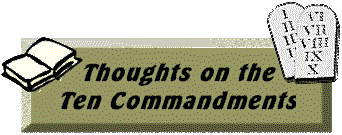
Introduction
Throughout the world, Jews and Christians claim to believe in (and to act on) the Ten Commandments as commands from God which God revealed to Prophet Moses (peace be
upon him). The point of this short essay is to do a close reading of the version of the Ten Commandments as contained in the New King James Version of the Holy Bible. Before
you proceed in reading the rest of this page, I would like to ask that you stop for one moment and ask yourself, "What do I believe concerning the Ten Commandments?" If
you believe that they are, in fact, from God, then the question is this...Are you willing to act on them? Is your church or synagogue willing to act on them?
The First Commandment
"You shall have no other gods before Me."
This is expressed beautifully in the first part of the shahada, or testimony of faith, as La illaha il Allah. "There is nothing worthy of worship except Allah." Both the shahada and the first commandment begin with a negation, and end with an affirmation. In Semetic languages (Hebrew, Arabic, & Aramaic) negation followed by
affirmation results in strong emphasis.
"They (Jews & Christians) took their Rabbis and their monks to be their lords beside Allah (by obeying them in things which they made lawful or unlawful according to their
own desires without being ordered by Allah), and (they also took as their lord) Messiah, the son of Mary, while they were commanded to worship none but the One God. There is
no god but He. Praise and Glory be to Him. He is far above having the partners they ascribe to Him."(Qur'an 9:31)
Once, while Prophet Muhammad (peace be upon him) was reciting the above verse, 'Adi bin Haatim said, "O Prophet of Allah! They do not worship their rabbis and their
monks." Muhammad (peace be upon him) replied, "They certainly do. The rabbis and monks made legal things illegal, and illegal things legal, and the Jews and Christians followed them; and by doing so, they worshipped them."
The Second Commandment
"You shall not make for yourself a carved image - any likeness of anything that is in heaven above, or that is in the earth beneath, or that is in the water under the earth."
In the opening paragraph, when I asked the question to the reader, "Are you willing to act on the ten commandments?" and "Is your church or synagogue willing to act on them?" this is the commandment that I had in mind. Because it is very simple; one or the other; either you abide by this commandment or you don't. Commandment #2, before murder and before adultery, commands the believer to avoid making, maintaining, or bowing to statues.
If your church has a statue of Jesus (peace be upon him) or Mary (may God be pleased with her), approach your pastor/priest/minister and ask how this can be when it
violates the second commandment. Is this a minor commandment, not as important as the others? If it is not important, then what does that say about the other nine? Is it now okay to murder? Commit adultery? Steal?
The Third Commandment
"You shall not take the name of the Lord your God in vain, for the Lord will not hold him guiltless who takes His name in vain."
The Fourth Commandment
"Remember the Sabbath day, to keep it holy. Six days you shall labor and do all your work, but the seventh day is the Sabbath of the Lord your God."
The Fifth Commandment
"Honor your father and your mother, that your days may be long upon the land which the Lord your God is giving you."
The Sixth Commandment
"You shall not murder."
The Seventh Commandment
"You shall not commit adultery."
The Eighth Commandment
"You shall not steal."
The Ninth Commandment
"You shall not bear false witness against your neighbor."
The Tenth Commandment
"You shall not covet your neighbor's house; you shall not covet your neighbor's wife, nor his male servant, nor his female servant, nor his ox, nor his donkey, nor anything that is your neighbor's."
Conclusions
The Word of God mixed with the word of man:
One does not have to be a religious scholar to open up the Book of Exodus, flip to chapter twenty (The Ten Commandments) and see for oneself that the Bible, itself, claims that it is not the pure Word of God. The first verse of Exodus 20 reads: "And God spoke all these words, saying..." These words are attributed to Moses (peace be upon him), a man. What follows are the Ten Commandments, and it is important to note that they are in quotes, indicating that someone is speaking. According to the first verse, God spoke what is in quotes. Well, what then of those words not in quotes? Surely these are not the
words of God.
Now, a likely response is that Moses was inspired by God and thus, the words he wrote are the words of God as well. What then of the few verses before the Ten Commandments, specifically Exodus 19:21-24? These verses start off referring to Moses (peace be upon him) in the third person, again indicating that he didn't write it either. These verses also put what Moses (peace be upon him) allegedly said in quotes. Using the same logic, whose words are the ones which are not in quotes? Perhaps Moses (peace be
upon him) wrote it down in the third person, knowing that others would read these words. This may be the case, but how is it that Moses (peace be upon him) wrote about his own
death?
Disobeying the First Commandment
The ancient Jews violated the 1st commandment (from an Islamic perspective) in a number of ways. First of all, they rebelled against many of the messengers (peace be upon
them all) and actually aided in their murders. Naturally, this does not implicate all of Judaism, as these acts were at the hands of a few.
However, the Jews who were not responsible for the deaths of the prophets, were still responsible for their messages. If they rejected those messages and messengers, then they, in fact, violate the first commandment. To reject a message sent by God for any reason, is to place that reason above God Himself. The same applies to the messages sent through Jesus and Muhammad (peace be upon both of them).
In addition, there are many stories in the Bible and the Qur'an relating how the ancient Jews rejected God in favor of worshipping other things (the calf, etc.). And, as mentioned in the saying of Muhammad above, they actually took their rabbis as lords simply by the fact that they obeyed the rabbis in favor of obeying God. This applies to Jews of today. One example of many is the Talmud and its ruling on interest/usury. The Talmud (a collection of the sayings of numerous rabbis) asserts that it is permissible for a Jew to charge a non-Jew interest on loans...though this is explicitly forbidden in Biblical Law. For the Talmudic reference see Sanhedrin 57a.
As for Christians, it is quite clear from the verse above that Christians (as the very name of the religion implies) worship Christ (peace be upon him). The word Christ comes from the Greek "christos" which means "to annoint", as does "messaha" in Hebrew, from which we get Messiah ("annointed one"). In Islam, we separate creation from the Creator and the Annointed one from the Annointer. God and Jesus (peace be upon him) are two separate and distinct entities. God sent Jesus to the earth. Muslims accept his virgin birth and his miracles, etc. However, we make a distinction between one who was born and the
One Who created birth, itself.
Christian worship of Christ (peace be upon him) is not like the Jewish worship of the rabbis of old. Because, the rabbis and their scribes after them were wrong for changing
the Law. Jesus (peace be upon him) however, was never wrong, nor did he change the Law. He only spoke the truth. He conveyed God's message as was commanded of him.
It is later generations who began worshipping him...in numerous ways...praying to him, doing things in his name, calling on him despite his absence, attributing his miracles to his own powers, etc; essentially giving him attributes that belong to God Alone.
Related Sites:
A Message from our Maker to the Children of Israel
The 10 Commandments & Confirmation in the Qur'an
Mosaic Floors in Ancient Synagogues
|

